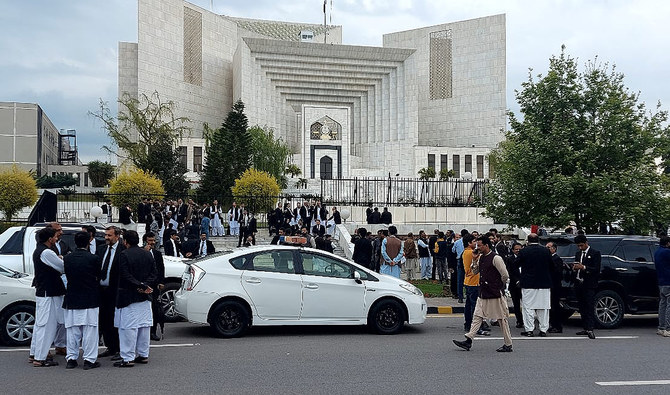By Staff Reporter
ISLAMABAD: The top court on Monday refused to block the appointment of Justice Sardar Muhammad Sarfraz Dogar as acting chief justice of the Islamabad High Court (IHC), deferring a decision on contentious judicial seniority disputes until days before a high-stakes meeting to confirm top judges nationwide.
A five-member constitutional bench, led by Justice Muhammad Ali Mazhar, dismissed an urgent plea by five IHC judges seeking to suspend Justice Dogar’s elevation.
The bench instead issued notices to key stakeholders — including three transferred judges, the Judicial Commission of Pakistan (JCP), and federal and provincial legal officers — and set the next hearing for April 17, just 24 hours before the JCP convenes to finalize appointments of acting chief justices across provincial high courts.
The petitions, filed by IHC judges Justices Mohsin Akhtar Kayani, Tariq Mehmood Jahangiri, Babar Sattar, Sardar Ejaz Ishaq Khan, and Saman Rafat Imtiaz, challenge the federal government’s February decision to transfer three judges from provincial courts to the IHC. The move placed the transferees — Justices Dogar, Khadim Hussain Soomro, and Muhammad Asif — above the petitioners in seniority, igniting claims of constitutional breaches in judicial appointments.
Senior counsel Muneer A. Malik, representing the petitioners, argued the transfers under Article 200(1) of the Constitution — which allows presidential reshuffling of judges with consent from the chief justice and relevant courts — were misused to sidestep constitutional safeguards under Article 175. He stressed that transferred judges must take a fresh oath under Article 194, a step skipped in this case, rendering their appointments “illegitimate.”
“Article 200(1) cannot override federalism, judicial independence, or the JCP’s role in appointments,” Malik said, citing rulings in Al-Jihad and Sharaf Faridi that tie judicial transfers to public interest. He highlighted irregularities, including one judge’s brief stint as an additional judge in Balochistan before his IHC transfer.
Justice Mazhar countered that Article 200 does not distinguish between temporary or permanent transfers. “We cannot ignore ground realities,” Justice Mazhar observed. However, he acknowledged seniority concerns, remarking that a transferred judge “must rank lowest in IHC seniority.”
Justice Naeem Akhtar Afghan questioned why transferred judges had not taken fresh oaths and why the JCP left IHC vacancies unfilled before the transfers.
The petitioners’ counsel argued that the transfers disrupted the IHC’s original seniority, which they sought to restore after their February representation to the IHC chief justice was dismissed. They urged the court to void the current seniority list, alleging it was compiled without due process.
The bench consolidated seven petitions but prioritized the lead case filed directly by the IHC judges, which challenges the “disruption of seniority” caused by the transfers. The court also plans to address objections to the petitions’ maintainability at the April 17 hearing.
Copyright © 2021 Independent Pakistan | All rights reserved




